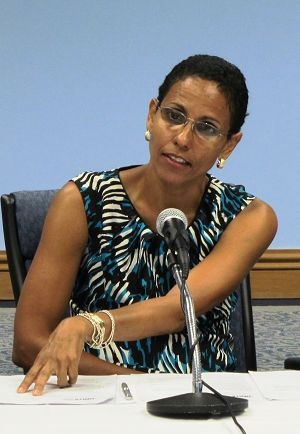Raise the Volume for the Right of Women to live lives free of violence
l=x.length;for(i=0;iDate:

Through partnerships between the women’s organisations, governments, development agencies, key community leaders such as our artists, the Caribbean is unite-ing in voice for women’s rights to lives free of violence.
At a meeting of Caribbean Ombudsmen, Police and victim support services, held in Barbados this year, a Protocol was developed to strengthen the support to and indeed responsiveness to victims of gender-based violence, and in particular sexual assaults. This Protocol which will be implemented in a number of countries in 2011 should ensure victims’ access to justice. Already the Protocol is being seen as a model for reference internationally.
In Grenada, in collaboration with the Ministry of Social Development and the Grenada National Organization for Women (GNOW) a domestic violence and sexual abuse protocol has been developed and most importantly it is being implemented.
Despite this progress, much remains to be done to build an effective prevention, protection, justice and social services response. In this regard, a number of countries have developed national action plans, including the Department of Gender Affairs of St. Kitts and Nevis and the Belizean Women’s Department, part of the Ministry of Human Development, whose Plan (NAP), was accepted by the Belizean Cabinet for implementation.
We must continue to call attention to the fact that while domestic violence legislation is in place in nearly every Caribbean territory, the rule of law is undermined by under-reporting as well as by high levels of attrition in the investigation and prosecution of sexual assault cases. Further, a victim/survivor's reluctance to report can be traced to instances where too often, the blame and responsibility for these types of crimes are directed at the victim/survivor rather than the perpetrator.
International Day for the Elimination of Violence against Women therefore marks the start of the observance of the period - 16 Days of Activism Against Gender Based Violence which culminates December 10, International Human Rights Day. This period was specifically chosen in order to symbolically link violence against women and human rights and to emphasise that such violence is a violation of human rights.
This year the global theme for 2011 commemorations is: From Peace in the Home to Peace in the World: Let’s Challenge Militarism and End Violence against Women! This global theme is focussed on the fact that women and girls, who hardly ever fight the world's wars, are more and more the direct targets of fighting, and that sexual violence is deliberately used as a tactic of warfare.
For the Caribbean, the theme has relevance given the high levels of violence and insecurity. Regional statistics on the incidence of violence against women show that between 2002 and 2008, 20% of homicides in Barbados were domestic-related and victims were all females. According to official reports, there were on average two rapes each day in Jamaica in 2010 and in Trinidad, domestic violence applications constituting approximately 19% of all magistrates’ court matters. In St. Kitts sexual offences accounted for 24% of the assizes list in 2009.
UN Women in partnership with its State and Nongovernmental partners is working to strengthen State accountability and community action for ending gender-based violence in eight Caribbean territories. This project includes:
- Developing multi-sectoral strategic plans to address the protection, prevention and punishment of sexual and gender-based violence
- Building the technical competencies of the justice and security sectors and the non-governmental sector to respond effectively to gender-based violence
- Building political will to address the significant gaps in policy frameworks for sexual and gender-based violence, particularly in the justice and security sectors
Regional police have been trained to more effectively respond to GBV and sexual offence cases through:
- internships with the Ottawa Police Service,
- through a Train the Trainer Course on the United Nations Police Standardised training on prevention and investigation of sexual and gender-based crimes, in Kigali, Rwanda
- and more recently a Train the Trainer Course on the Guide to Police Responses to Sexual Assault” Training Curriculum and Manual which was commissioned by UN Women and the Barbados-based Regional Police Training Centre.
Getting to gender equality requires that women are empowered to demand their equality in their spaces they inhabit, public and private. But getting to gender equality also demands that men understand and commit to individually and collectively to change, to being the voice for equality, holding each other actively to account for discrimination and exploitative conduct towards women.”
On the advocacy front, at UN Women, we have been joined in our efforts by faith based leaders and institutions, by men led by the Caribbean Male Action Network (CariMAN), and by soca and reggae artists from Barbados, the Eastern Caribbean, Trinidad and Tobago and Jamaica and indigenous artistes from the mainland territories of Belize, Guyana and Suriname who have committed their talent and their voices to the campaign. Indeed these and other partners were identified at a Caribbean Consultation held to define our response to the UN Secretary General’s call for us all to participate in the campaign to end violence against women. The Campaign calls for us to UNiTE, to work in solidarity, to speak in one voice, to carry one consistent message and that message is zero tolerance.
We have to continue to UNiTE our voices and raise the volume for the right of women to live lives free of violence!
Roberta Clarke
Regional Programme Director – UN Women Caribbean Office
For further information please contact, Communications Specialist SharonCarter-Burke at email: E-mail: or telephone: (246) 467-6000 Ext 6124.